
What’s the Best Database for Company Information? 20+ Options
Simone Autiero, 13 October 2023
- Some databases focus on specific geographies. Some only hold information on particular regions, like the USA or APAC, or have granular data on smaller localities, such as towns in southwest England.
- They have different levels of data. One may provide detailed information on a company’s whole lifecycle, including past directors and funding rounds, while others offer an overview of a region’s broad business trends.
- They use different sources of data. For instance, some are just registries of legal entities, while others compile data from multiple sources to create a richer picture of businesses and their operating environments.
- They’re better-suited to different types of research. Some business databases are built for journalists or civil society groups. Others provide sales teams with professional contact information. As a result, the information itself differs.
- They differ in pricing, too. Most government registries are free. But the more premium services with deeper business profiles charge for access.
As such, there’s no “best database for company information” that will fit every single use case. But when you’re choosing a database to use, first pay attention to the quality of data it uses. If you’re basing your critical decisions on this information, you need to be sure that it’s up-to-date, complete, and accurate. Sadly, that’s not always a given.
In this guide, we’ll introduce you to more than 20 of the best databases for company information. We’ll cover everything from government registries to startup platforms, and databases for general research. (We’ll start this post with our very own Beauhurst platforms, which contain the most comprehensive database on companies based in the UK).
You can access our data via four different platforms built with different users in mind: universities and governments, investors, financial and professional services, and sales teams. Read on to find out more or book a demo to see how Beauhurst works for you.
1. Beauhurst: The best database for private company information in the UK
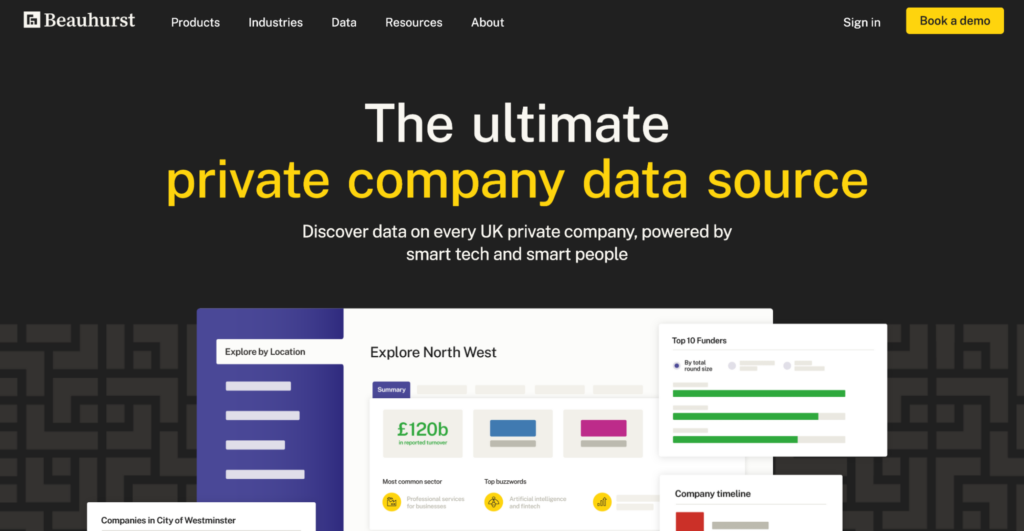
Beauhurst is the most comprehensive database on private companies in the UK. Through our data, you can access data on every private company in the UK, and search and compare these businesses by hundreds of criteria.
Plus, you’re not limited to searching by specific companies. Instead, with Beauhurst, you can dig down into broader regional trends or find influential people in particular fields. That’s why we’re trusted by universities, local governments, sales teams, and investors.
As an example, the University of Manchester uses Beauhurst data to find, monitor, and engage with local SMEs, in order to identify potential knowledge exchange programmes. In a different sector entirely, FPE Capital uses Beauhurst to find investment opportunities in the technology industry. As FPE Capital’s Investment Manager, Ben Cole, says, “You’ll find more information on a company through Beauhurst than any other platform I’ve seen.”
Organisations use our platform to:
- Get up-to-date, in-depth data on all UK companies
- Search for businesses by sector, location, and many other criteria
- See a picture of live, local trends
1. Get up-to-date, in-depth data on all UK companies
With Beauhurst data, you can access up-to-date information on every single UK company.
We bring together thousands of data points from a huge range of different data sources, including government offices such as HMRC and Companies House, censuses and patent registries, the media, and companies themselves. Our team of more than 60 data analysts enrich and standardise that data so it’s searchable, comparable, and easy to navigate.
Thanks to this, whenever you search for a company through Beauhurst, you’ll see a rich and complete profile of that business. Whatever information you’re looking for—whether company holdings, ownership structures, or funding rounds—it’s easy to find.
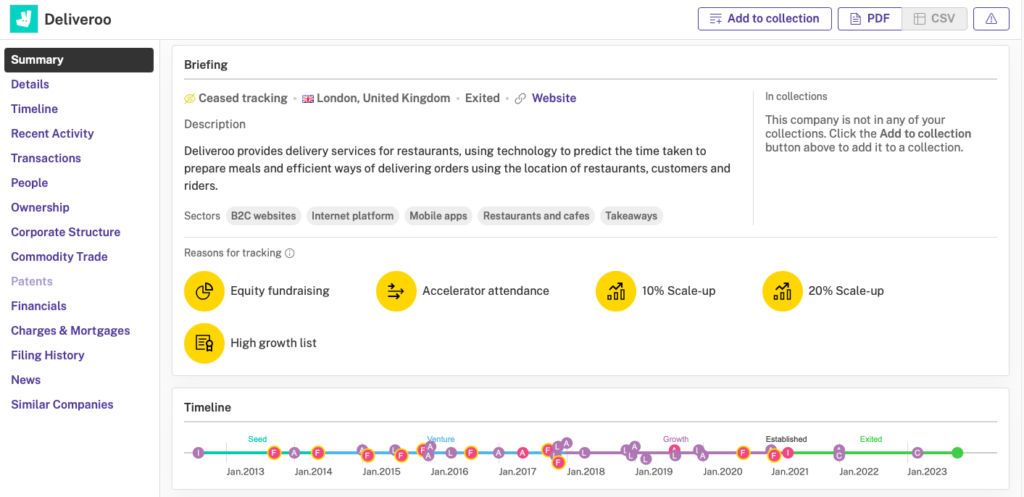
- Key events in a business, such as whether they’ve received recent funding or they’ve become publicly listed.
- Their operating headquarters. On many other databases, you’ll only find their legal registered address, which is often different to where they actually operate.
- Financial information, including annual reports with key data points such as turnover, total assets, and stock prices.
- Influential people, including owners, executives, and investors.
- And lots more. You can find out more about our company data here.
You can use this data to uncover the exact sorts of businesses you’re looking for. For example, you can easily see how companies are growing, who works there, and how they contribute to the local economy. As just one example, the private share trading platform, JP Jenkins, uses Beauhurst to vet inbound leads, identify prospects, and perform due diligence on companies before inviting them to their platform.
“Beauhurst has been really, really important to us,” Mason Doick, Head of Corporate at JP Jenkins, says. “It’s been vital not only for the valuations, financials and filings metrics, but also to enable us to focus on how we target and review companies that are suitable to build a pipeline of ideal clients.”
2. Search for businesses by sector, people, and many other criteria
Beauhurst makes it easy to search across the entire UK business environment. Rather than trawling through thousands of profiles individually, Beauhurst lets you immediately identify companies that match the very specific criteria you need.
For instance, if you’re an investor looking for specific companies to fund, you’ll have particular location or size criteria they need to match. The same if you’re a local authority looking for business directors, or a university in search of partners for knowledge exchange.
Searching for these individuals manually is a huge drain on time. With Beauhurst’s “Advanced Search” functionality, you can find the perfect fit in just a few clicks.
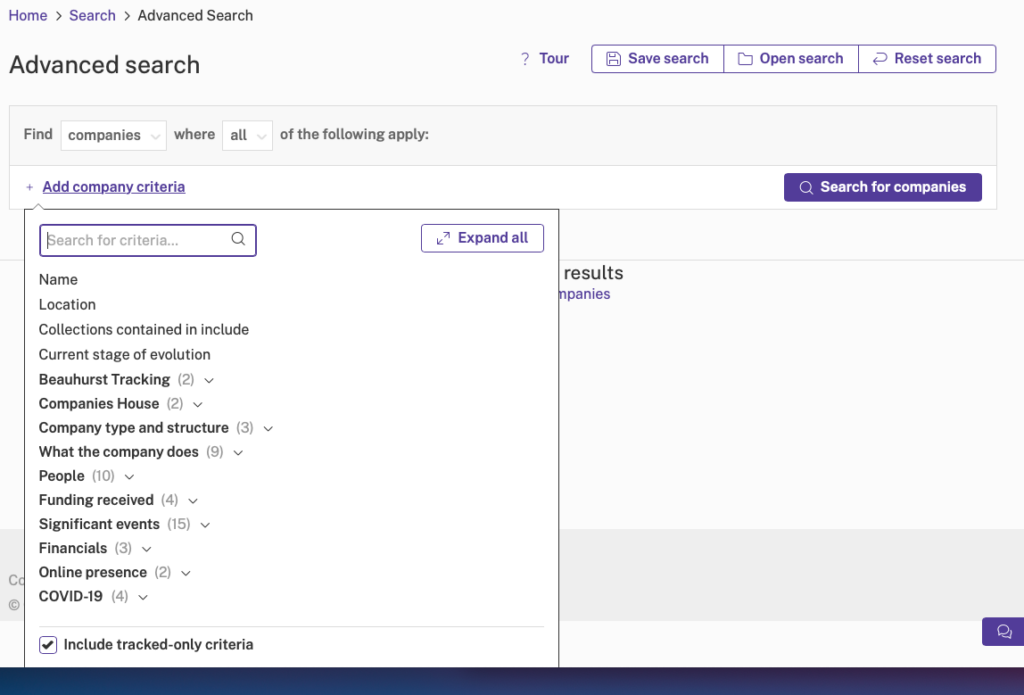
- Current stage of evolution, to limit your search to only startups, scaleups, or public companies.
- What the company does. You can search by Standard Industrial Classification (SIC) codes, or get a more up-to-date picture of the business landscape by searching by buzzword, such as “blockchain” or “precision agriculture”.
- People. Search companies that certain individuals worked at, or by gender balance.
- Significant events, such as whether the company has spun out of a university or received funding.
- Financials. For example, you can refine your search to companies that have a turnover above £1m.
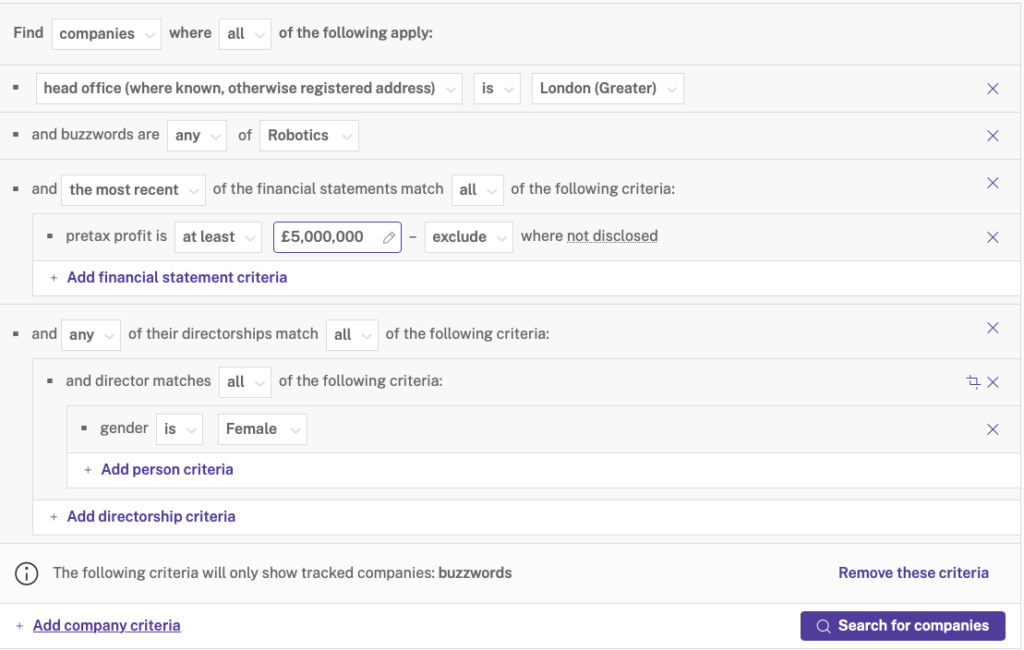
You don’t have to only search for private companies with Beauhurst. You can also search for people, funds, specific IPOs, and much more. For example, you could search for individuals that have been directors in a local accountancy SME, or use the database to look for acquisitions that were above a particular valuation.
As an example, the Science and Technology Facilities Council (STFC) uses Beauhurst to support its work in forging links between the science community and businesses. One task to which Beauhurst’s data is central is in identifying and supporting early-stage space tech startups to innovate and scale.
“The ability to create very specific custom searches on almost any company characteristic lets me target businesses with a really high level of granularity,” says Sue O’Hare, Operations Manager at the STFC. “I love the feeling of having information at my fingertips and the knowledge that I can get what I need. If you need timely and comprehensive information about early-stage high-tech startups, you should be looking at Beauhurst.”
3. See a picture of live, local trends
Beauhurst is an unmatched platform for searching for and accessing information on specific businesses. But you can also use our company database to get an up-to-date picture of the business landscape in a particular area.
For example, if you search Beauhurst for businesses in Edinburgh, you’ll be shown in-depth and up-to-the-minute information about what’s happening in the city. The below graphs show the amounts raised through fundraisings and the latest turnover of some of the bigger businesses based in the city.
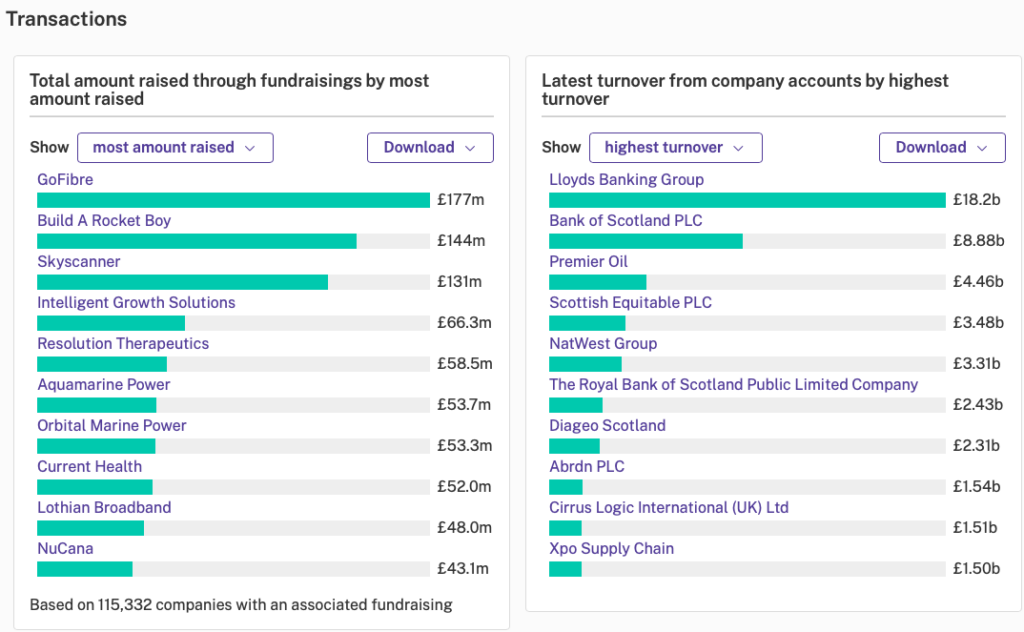
- The number of new businesses those that ceased operating
- A breakdown of industries by number of businesses or highest growth
- Employee numbers in each company, including by gender
- Employment rates, job statistics, and which skills are most in demand
- Media stories about specific businesses
- Overall trends

If you’re particularly interested in a local area—or in companies that meet any criteria—you can save your search to the “My Collections” tab in your Beauhurst dashboard.
This means that you don’t need to start a new search to keep up to date on changes in your area. Rather, you can receive notifications to let you know whenever a new business has entered the market, there has been a merger, or a company has received a round of funding. You’ll be alerted in real time, or whenever you choose to receive the notification.
The Lancashire County Council uses Beauhurst’s “My Collections” feature to track specific businesses in the local area.
“Rather than searching across specific criteria on Beauhurst on a regular basis, I have Collections set up based on my key drivers,” Amin Vepari, Business Finance and Scaleup Lead, explains. “This means I can get weekly updates on relevant businesses, [which] allows us to be more proactive and ahead of the curve.”
“With Beauhurst, we have access to real-time information, with a level of detail that we wouldn’t get anywhere else. And it’s very, very easy to use.”
Book a demo with us to see how Beauhurst can work for you.
Government databases of business information
Alongside Beauhurst, another potentially-useful source of company information is government business registries. It’s often obligatory for businesses to provide some basic information, which is then listed publicly by various government offices.
As such, government registries are a great starting point for business information. However, they won’t give you the depth of information you’d get from any of the Beauhurst platforms. Plus, every locality will have different requirements for the information they include.
That said, here are 5 government business sources that can be useful.
Region: UK
Cost: Free
Companies House is the UK’s official registry of businesses. All companies that are based in the UK are obliged to provide information to the database when they’re set up.
That means that if you’re looking for UK businesses, Companies House is a pretty comprehensive resource. In fact, it has the reputation for being one of the most easy to use national business registries in the world.
However, for those seeking deep, clean, standardised information, it does have its limitations. One is that companies need to update the information themselves, and Companies House explicitly says it “does not verify accuracy of information filed”.
(Find out more: How to Get the Most out of Companies House Data)
Region: UK
Cost: Free
The Office for National Statistics (ONS) is less a database than a collector and publisher of statistics.
That means it’s not searchable by business in the way that something like Beauhurst or Companies House is. Rather, it’s much more useful as a source of information on national trends and broader patterns, which it aggregates from censuses and its own surveys.
As the UK’s official government body responsible for data on business, society, and demographics, the information it provides is incredibly authoritative. And it can be used as an effective complement to other data providers.
Region: USA
Cost: Free
The Securities and Exchange Commission (SEC) is the US government agency that oversees the stock market. As part of this role, it holds the national register of publicly traded companies.
This database is often compared to the UK’s Companies House, as it can provide in-depth information on companies that are included. However, as the SEC only includes publicly traded companies, you won’t find data on smaller businesses or those with private shares.
Alongside its business register the SEC regularly releases other datasets, on financial statements or other business metrics, that can inform your research. Note that these are published at irregular intervals and you’ll need to download .zip files to access the data.
5. Company registers by state
Region: US states
Cost: Free
In the US, state authorities collect information on individual businesses. But as laws differ from state to state, the information collected differs depending on where that business is located.
State business databases differ dramatically by the depth and quality of data. You can find a lot of useful information, depending on what you need. Just be aware that it is not very easy to compare companies in different states.
For instance, you can use:
Region: Europe
Cost: Free
Most countries in Europe have their own business registers, just like the UK’s Companies House. The European Union set up the European Business Register to centralise and standardise all the information from these databases, via the Business Registers Interconnection System (BRIS).
Currently, you can only search the system by business name, and you’ll receive basic information on companies including registered addresses.
Business databases for international research
Region: Global
Cost: Free
Featuring over 200 million companies in 140 geographies, OpenCorporates calls itself the largest open database of corporates in the world. The platform sources data from government business registries across the world, giving it an incredible breadth of coverage.
The platform does standardise all the information across all regions, making it really easy to navigate and compare. But if those registries have any inaccuracies, those same limitations will pop up in OpenCorporate data.
What distinguishes OpenCorporates from other databases of business information is its social purpose, which makes it a preferred tool of journalists, universities, civil society, and anti-corruption investigators. Its central goal is to boost corporate transparency, and as such it’s completely free.
Region: US and global
Cost: Institutions pay an annual fee
Mergent Online is a database that holds information on a large range of global companies, but its focus is on publicly traded companies.
It’s based in the US and that’s where the best part of the 40,000 companies it includes are from. Alongside that though, it offers users access to financial data on public companies from around the world, representing a total of 95% of the non-US global market capitalisation.
As it features profiles of both active and inactive companies, Mergent is a great source of historical data on companies and industry reports. Researchers and analysts mainly use it to access financial information on companies, including stock prices and annual reports. Plus, it provides up-to-date news on each of the 15,000 US companies it tracks.
Region: Global
Cost: Institutional access via public or university libraries
Gale Business: Insights is mainly aimed at researchers in academic contexts, although businesses can use it too. Whatever type of research you’re doing, you can access over 430,000 company profiles, plus country overviews and industry summaries.
Like many of the other databases for business intelligence on this list, Gale offers comprehensive information on company history, hierarchy, financial data, and news. Plus, if you want to compare different companies, that’s really easy through the downloadable competitive comparisons.
One of the main appeals of Gale is its UX, with interactive tools for visualising data.
Region: US and global
Cost: Unknown
Compustat is the database of Standard & Poor Global, the US-based corporation for business analytics. As such, the focus of the data is financial.
Its core product is its standardised financial statements for over 80,000 publicly traded companies, both in North America and globally, and both active and inactive. Plus, it includes other financial reports from these companies too, including balance sheets, cash flows, and income data. If you need financial information on public companies, or you’re doing market research, this could be a good tool.
Region: North America
Cost: Starting from $79 a month
Previously known as ReferenceUSA, Data Axle is a data platform offering information on private companies and consumers in the United States and Canada.
It has data on 17 million businesses in North America, from the Fortune 500 to independent shops and freelancers. With data including contact information, numbers of employees, and more, it’s an impressive resource if you’re not looking just for publicly traded companies.
Data Axle also has a large team of data experts who call businesses directly to verify information and update the platform in real time.
Region: Global
Cost: Contact Orbis for pricing
Bureau van Dijk is one of the larger data providers in the world, and Orbis is its global business database. It has information on over 450 million companies and legal entities across the planet, which it sources from over 170 sources. Plus, like Beauhurst, it standardises that information and makes it comparable.
For a comprehensive database of global companies, it’s a good choice.
Databases for information on global startups
Some of the most difficult businesses to discover and research are often startups. Many databases aren’t always sufficiently up to date to cover the newest businesses, while others don’t have enough information on business growth and funding to be actually reliable.
The following databases do a good job of providing that information.
(Remember: if you want comprehensive data on UK startups, nothing beats Beauhurst. Our data is trusted by clients including JP Morgan, Coutts, and the University of Manchester. “With Beauhurst, the depth of the company profiles and the way that they’re structured makes everything so easy,” says Chris Hobbs, Head of Business Strategy at Satellite Applications Catapult. “My reporting process has now been reduced from a day and a half of manual research to less than half an hour—start to finish—using Beauhurst. And I can be sure I’m getting comprehensive data.”)
Region: Global
Cost: There are multiple products with different pricing, up to $5,000 annually
Perhaps the most famous database for information on startups is AngelList. It started life as an introduction board for startups that wanted seed funding, but over the years it’s become the platform where startups and investors can connect and get funding.
If you’re an investor, you can search the platform to find startups that match your investment criteria. Or you can download industry reports to discover broader startup trends.
Region: US-based but global data
Cost: Individual plans start from $49 a month. Contact Crunchbase for enterprise plans
While Crunchbase claims to be a database for all private and public companies, most of its users make use of its data on tech companies in particular.
It’s primarily a prospecting tool, where businesses and other people can find information on early-stage startups and other companies, plus who works in each company. All that information is crowdsourced, meaning it’s supplied by the users themselves—which can sometimes lead to inaccurate information.
Crunchbase also provides reports on startups, industry news, and relevant trends by region.
Region: Global
Cost: Contact CB Insights for pricing
CB Insights claims to have the world’s largest dataset on technology companies and trends. It’s used by some of the biggest companies—including Microsoft, IBM, and Wells Fargo—to find information they need to build relationships, understand markets, and decide who to fund or to acquire.
Much of this data is provided by startups themselves, which CB Insights asks for information through its “Analyst Briefing” program. But it complements that information with multiple other data sources.
Region: Asia
Cost: Unknown
e27 is the best database for business information on Asian startups. If you’re looking for data on the tech ecosystem in this part of the world, e27 will be your best resource. At the time of writing, e27 had over 35,000 startups listed on its platform. All of them are searchable and comparable by location, industry, funding, and more.
Then, once you’ve found a specific company that matches your criteria, it’s easy to connect with them too. The platform will link you to the startups’ social media sites including LinkedIn.
Company information databases for lead generation (only)
One common reason why professionals look for databases of company information is for lead generation. Some databases are built only with this use case in mind, but the data quality is hit-and-miss. (Note: You can find contact details for key personnel on any of Beauhurst’s platforms, too. But if you’re looking for a “quick and dirty” contact list, we’re not for you.)
Region: UK and Ireland
Cost: Prices start from £50 + VAT annually
One well-known platform that’s used for lead generation is Company Check. With data on over 5 million companies from the UK and Ireland, it’s a reasonably comprehensive source of business information. Users can access financial information on businesses too, as well as business credit checks for purposes of due diligence.
Region: Global
Cost: The 5 different products have different prices. Contact ZoomInfo for details.
ZoomInfo is one of the largest databases of company contact information. It works like a search engine, where businesses can search for prospects and close deals. The platform sources its data from multiple providers, alongside a team of researchers as well as community contributors. This way, it tries to keep its data as up-to-date as possible. Although this tool serves its purpose by providing contact details for potential clients, it lacks accompanying company data. That’s where Beauhurst comes into play, enabling sales teams to identify the most promising accounts to prioritise their efforts.
Region: Nordics and global
Cost: Plans for Nordic data only start at €4,200. Plans for global data start at €12,000.
Vainu is a B2B data platform that’s designed to speed up customer acquisition. You can access Vainu’s broad range of company data directly through the website, through your CRM, or through a browser extension. You can find the companies that are most relevant to you by searching through multiple overlapping criteria.
The company is based in Helsinki and has focused on Nordic companies, making it the most comprehensive database in the region. These days, Vainu collects data on companies globally.
Region: EMEA, NAM, APAC
Cost: Contact Cognism for pricing details
Cognism is another database of business contact information. It claims to have the largest dataset of European companies, as well as the richest collection of mobile phone details in the US. The database allows you to search for companies by location, industry, size, and more, allowing you to identify your specific market. One of the things that makes it stand out is that it verifies key contact details, so that you can trust their accuracy. Beauhurst complements this tool by providing the missing company data component, allowing sales teams to make informed decisions on which accounts to prioritise, while still utilising the tool’s functionality to find contact details for potential clients.
Beauhurst: The database for UK company information you can trust
In this guide, we’ve covered 20 top databases of company information, for different use cases, regions, and industries. Depending on your needs, you’ll find the perfect fit.
If you’re looking for a premium database of rich, comprehensive, searchable, and comparable UK company information, Beauhurst is your best choice. With a Beauhurst subscription, you can:
- Access the deepest information available on all UK companies
- Search for companies and people by region, industry, fundraising, and many other overlapping criteria
- Track the performance of regions or companies in real-time
“You probably don’t realise how little you know about businesses until you have Beauhurst,” says Finn Morgan, Business Engagement & Dorset Gateway Manager at the Dorset LEP.
“It enables you to see the bigger picture, a company’s origins, its people and their networks. Having access to Beauhurst is like having a colleague, not just a data platform.”
Book a demo to find out how Beauhurst works for yourself.
Grow your business.
Get access to unrivalled data on all the companies you need to know about, so you can approach the right leads, at the right time.
Book a demo today to see all of the key features of our platforms, as well as the depth and breadth of data available.
An associate will work with you to build a sophisticated search, returning a dynamic list of organisations that match your ideal customer profile.
Beauhurst Privacy Policy